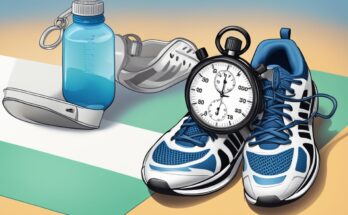Many people enjoy running as a way to stay in shape, relieve stress, and improve overall health. However, some may find that their running stamina is lower than they would like it to be. This can be frustrating and discouraging, especially for those who have been consistently running but still struggle to improve their endurance.
There are several factors that can contribute to low running stamina. One of the most common is lack of consistent training. Running is a high-impact activity that requires regular practice and conditioning in order to build endurance and stamina. Without consistent training, the body may not be able to adapt to the demands of running and may struggle to maintain a steady pace or distance. Additionally, poor nutrition, inadequate hydration, and lack of rest and recovery can also impact running stamina.
Understanding Stamina and Endurance
Stamina and endurance are two interrelated concepts that are essential for any physical activity, including running. Stamina refers to the ability to sustain physical or mental effort for an extended period. Endurance, on the other hand, is the ability to withstand fatigue or resist the onset of exhaustion during prolonged physical activity.
Physical stamina and mental stamina are two types of stamina that are relevant for running. Physical stamina refers to the body’s ability to perform physical tasks without getting tired or fatigued too quickly. Mental stamina, on the other hand, refers to the ability to stay focused and motivated during a long run or workout.
Cardiovascular endurance and muscular endurance are two types of endurance that are relevant for running. Cardiovascular endurance refers to the ability of the heart, lungs, and blood vessels to deliver oxygen and nutrients to the muscles during prolonged physical activity. Muscular endurance refers to the ability of the muscles to contract repeatedly over an extended period.
To improve running stamina and endurance, it is essential to focus on both physical and mental aspects. Here are some tips to improve running stamina and endurance:
- Gradually increase the duration and intensity of the workout.
- Incorporate strength training exercises to improve muscular endurance.
- Focus on breathing techniques to improve cardiovascular endurance.
- Maintain a healthy and balanced diet to provide the body with the necessary nutrients.
- Stay hydrated before, during, and after the workout.
In summary, understanding the concepts of stamina and endurance is crucial for improving running performance. By focusing on both physical and mental aspects and following the tips mentioned above, runners can improve their stamina and endurance and achieve their fitness goals.
Factors Affecting Running Stamina
Physical Factors
Running stamina is influenced by various physical factors. Age, fitness level, strength, body composition, and thyroid function all play a role in determining the endurance of a runner.
Age: As people age, their muscle mass and bone density decrease, which can lead to a decline in running stamina. Older runners may also experience a decrease in lung capacity and a slower recovery time.
Fitness Level: A person’s fitness level is a crucial factor in determining their running stamina. Regular exercise, including running, can improve cardiovascular health, increase lung capacity, and promote endurance.
Strength: Strength training is essential for runners as it helps to build muscle, improve endurance, and reduce the risk of injury. Stronger muscles help to support the body during running, allowing for more extended periods of endurance.
Body Composition: Body composition, particularly the percentage of body fat, can impact running stamina. Excess body fat can make running more challenging and lead to decreased endurance.
Thyroid Function: The thyroid gland produces hormones that regulate metabolism and energy levels. An overactive or underactive thyroid can negatively impact running stamina.
Mental Factors
In addition to physical factors, mental factors can also affect running stamina. A runner’s mindset, motivation, and ability to manage stress can all impact their endurance.
Mindset: A positive mindset can help a runner push through fatigue and improve endurance. Negative thoughts, on the other hand, can lead to decreased motivation and a shorter endurance.
Motivation: Runners who lack motivation may struggle to maintain their endurance during a run. Finding a purpose for running, setting goals, and tracking progress can help to increase motivation and improve endurance.
Stress Management: High levels of stress can negatively impact running stamina. Learning to manage stress through techniques such as meditation, deep breathing, or yoga can help to improve endurance.
Overall, running stamina is influenced by a combination of physical and mental factors. By focusing on improving fitness levels, strength, and mindset, runners can increase their endurance and enjoy longer, more fulfilling runs.
Role of Diet and Hydration
Importance of Hydration
Staying hydrated is crucial for maintaining good running stamina. When the body is dehydrated, it can lead to a decrease in blood volume and a rise in heart rate, making it harder to maintain a consistent pace. In addition, dehydration can lead to muscle cramps and fatigue, which can further reduce running performance.
To stay hydrated, it is recommended to drink water before, during, and after running. The amount of water needed varies depending on factors such as temperature, humidity, and individual sweat rate. A good rule of thumb is to drink at least 8-10 ounces of water every 15-20 minutes during exercise.
Role of Complex Carbohydrates
Complex carbohydrates are an important source of energy for runners. They are broken down slowly by the body, providing a steady stream of energy over a longer period of time. This can help prevent blood sugar crashes and keep energy levels consistent throughout a run.
Foods such as whole grain bread, potatoes, and fruits are good sources of complex carbohydrates. It is recommended to consume these foods 2-3 hours before running to allow for proper digestion.
In addition, it is important to avoid sugary and processed foods, as they can cause blood sugar spikes and crashes, leading to a decrease in energy levels and stamina.
Overall, a balanced diet that includes complex carbohydrates and proper hydration can play a significant role in improving running stamina.
Impact of Exercise and Training
Regular exercise and training can significantly improve running stamina. By engaging in physical activity, the body adapts to the demands placed on it, resulting in increased endurance and strength. Here are some types of exercise and training that can help improve running stamina.
Interval Training
Interval training involves alternating between high-intensity and low-intensity exercise. This type of training is effective for improving running stamina as it helps increase the body’s VO2 max, which is the maximum amount of oxygen the body can use during exercise. By doing intervals, the body learns to use oxygen more efficiently, leading to improved endurance.
Strength Training
Strength training involves performing exercises that target specific muscle groups, such as the legs, core, and arms. By building muscle, the body becomes more efficient at using energy, resulting in improved running stamina. Additionally, strength training can help prevent injuries by improving overall body strength and stability.
High-Intensity Workouts
High-intensity workouts, such as HIIT (High-Intensity Interval Training), involve short bursts of intense activity followed by periods of rest. These workouts can help improve running stamina by increasing the body’s anaerobic threshold, which is the point at which the body switches from using oxygen to using stored energy. By increasing the anaerobic threshold, the body can sustain high-intensity exercise for longer periods of time.
In summary, incorporating interval training, strength training, and high-intensity workouts into a training routine can help improve running stamina. By varying the frequency, reps, and intensity of these exercises, the body can adapt and become more efficient at using energy, resulting in improved endurance and overall fitness.
Importance of Rest and Recovery
Rest and recovery are two crucial aspects of any fitness routine, especially when it comes to building stamina. In this section, we will discuss the importance of rest and recovery, and why they are essential for improving running stamina.
Understanding Overtraining
Overtraining is a common problem among runners who push themselves too hard without giving their body enough time to recover. This can lead to a decrease in stamina, as well as an increased risk of injury. Overtraining occurs when the body is subjected to more stress than it can handle, and it can be caused by a variety of factors, such as:
- Training too frequently
- Training for too long
- Not getting enough sleep
- Not taking enough rest days
To avoid overtraining, it’s important to listen to your body and give it the rest it needs. This means taking rest days, reducing the intensity of your workouts, and making sure you’re getting enough sleep.
Importance of Sleep
Sleep is a crucial component of rest and recovery, and it plays a vital role in improving running stamina. When you sleep, your body repairs and regenerates itself, which is essential for building endurance. Lack of sleep can lead to a decrease in stamina, as well as an increased risk of injury.
To improve your running stamina, it’s important to get enough sleep each night. The National Sleep Foundation recommends that adults get between 7-9 hours of sleep per night. If you’re having trouble sleeping, try establishing a bedtime routine, avoiding caffeine and alcohol before bed, and creating a comfortable sleep environment.
In conclusion, rest and recovery are essential for improving running stamina. By understanding the importance of rest and recovery, and taking steps to avoid overtraining and get enough sleep, you can build endurance and improve your overall fitness.
Effects of Environmental Factors
Impact of Warm Air and Pollutants
Environmental factors such as warm air and pollutants can have a significant impact on a runner’s stamina. When the air is warm, the body has to work harder to cool itself down, which can lead to an increase in heart rate and a decrease in stamina. Pollutants in the air can also make it more difficult to breathe, leading to shortness of breath and a decrease in overall endurance.
One study found that exposure to high levels of ozone, a common air pollutant, can lead to decreased lung function and increased shortness of breath during exercise. Other pollutants such as particulate matter and nitrogen dioxide have also been shown to have negative effects on respiratory health.
To combat the effects of warm air and pollutants, runners can try to avoid exercising during peak pollution hours and in areas with high levels of pollution. They can also wear a mask to filter out pollutants and try to exercise in cooler temperatures when possible.
Exercise-Induced Asthma
Exercise-induced asthma is a condition where physical activity triggers asthma symptoms such as wheezing, coughing, and shortness of breath. This can lead to a decrease in stamina and make it difficult for runners to maintain their pace.
One study found that up to 90% of people with asthma experience exercise-induced symptoms. This can be especially challenging for runners who rely on their stamina to maintain their pace and complete their workouts.
To manage exercise-induced asthma, runners can work with their healthcare provider to develop an asthma action plan. This may include the use of medication before exercise, warming up slowly, and avoiding exercise in cold, dry air.
Overall, environmental factors can have a significant impact on a runner’s stamina. By understanding the potential effects of warm air, pollutants, and exercise-induced asthma, runners can take steps to minimize their impact and maintain their endurance.
Role of Mental Focus and Mood
Influence of Music on Running Stamina
Music can have a significant impact on a runner’s stamina. Studies have shown that listening to music while running can improve performance by reducing perceived exertion and increasing motivation. This is because music can help distract runners from feelings of fatigue and discomfort, allowing them to push harder and run for longer periods of time.
However, it’s important to note that not all music is created equal when it comes to improving running stamina. Upbeat, high-energy songs with a fast tempo are generally more effective than slower, more relaxing tunes. It’s also important to choose music that matches the runner’s preferred pace and running style.
Impact of Caffeine on Stamina
Caffeine is a stimulant that can help improve mental focus and alertness, making it a popular choice among runners looking to boost their stamina. However, it’s important to use caffeine in moderation and to be aware of its potential side effects, such as increased heart rate and dehydration.
Studies have shown that caffeine can improve endurance performance by reducing perceived exertion and delaying fatigue. However, the effects of caffeine can vary depending on the individual and their tolerance level. It’s important to experiment with caffeine intake during training runs to determine the optimal dosage and timing for maximum benefits.
In conclusion, mental focus and mood can play a significant role in a runner’s stamina. By incorporating strategies such as listening to music and using caffeine in moderation, runners can improve their mental and physical performance and achieve their running goals.
Conclusion
In conclusion, low running stamina can be caused by a variety of factors, including poor endurance, a low fitness level, and inadequate training. However, with the right approach and dedication, it is possible to improve one’s running stamina and overall fitness.
To improve endurance and running stamina, it is important to follow a consistent training plan that gradually increases in intensity and duration. Incorporating strength training and cross-training activities can also help improve overall fitness and prevent injury.
In addition, paying attention to nutrition and hydration can also play a significant role in improving running stamina. Eating a balanced diet that includes plenty of carbohydrates, protein, and healthy fats can provide the energy needed for running, while staying hydrated can help prevent fatigue and cramping.
Overall, improving running stamina requires a combination of factors, including consistent training, proper nutrition and hydration, and a commitment to overall fitness. With dedication and hard work, anyone can improve their running stamina and achieve their fitness goals.




